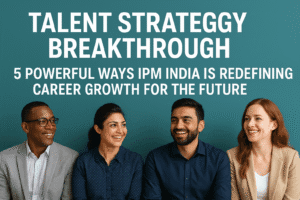Talent Strategy Breakthrough: 5 Powerful Ways IPM India is Redefining Career Growth for the Future
IPM India prioritizes talent growth over business expansion, embedding a culture where employees co-create their careers through global mobility, cross-market experiences, and tailored learning. Its three-pillar approach—global pathways, integrated development, and self-driven ownership—replaces rigid hierarchies with adaptable growth. The “PMI DNA” values (empathy, collaboration, agility) turn principles like “We Care” into daily practices: mentoring, cross-functional projects, and intelligent risk-taking. Leaders stress that investing in people isn’t altruism—it’s strategic foresight for volatile markets. External validations (4 years as a Great Workplace, WSJ’s top 10 management ranking) underscore its success. Ultimately, IPM India proves that when talent development becomes cultural infrastructure—not a perk—business resilience follows organically.

Talent Strategy Breakthrough: 5 Powerful Ways IPM India is Redefining Career Growth for the Future
In India’s competitive corporate landscape, talent retention often feels like a numbers game. But IPM India—Philip Morris International’s local affiliate—is taking a counterintuitive stance: “Talent growth must outpace business growth.” This philosophy anchors their strategy to build a future-ready workforce while navigating complex market dynamics.
The Three Pillars Redefining Careers
- Global Pathways, Local Relevance
Rather than siloed roles, IPM India offers cross-market mobility (global/regional), exposing employees to diverse business models and cultural contexts. This isn’t just résumé padding—it’s about cultivating leaders who understand how to adapt strategy across borders.
- Learning as an Ecosystem
Beyond formal training, the company blends mentorship, stretch assignments, and “career conversations” to turn daily work into growth opportunities. The focus? Building business acumen, not just skills—a subtle but critical shift.
- Ownership Over Progression
Employees co-create their paths through structured self-reflection (“Where am I? Where do I want to be?”). This reduces dependency on hierarchical promotions, fostering accountability and innovation at all levels.
The Cultural Engine: PMI DNA in Action
IPM India’s values—dubbed “PMI DNA”—prioritize empathy, collaboration, and agility. But what makes this impactful?
- “We Care” manifests as managers trained in active listening, reducing attrition.
- “Better Together” drives cross-functional projects that break down internal competition.
- “Game Changers” rewards calculated risk-taking, even in failures.
Leadership Insights
Navaneel Kar (MD) notes: “Growth isn’t a program—it’s our cultural fabric. When people see daily challenges as learning moments, business acceleration follows organically.”
Kingshuk Das (People & Culture Director) adds a crucial nuance: “Investing in talent isn’t altruism—it’s strategic foresight. An adaptable workforce is our only sustainable edge in volatile markets.”
Validating the Approach
The results speak through external recognition:
- Great Place to Work® Certified (4 years consecutively)
- Top Employer India (5 years running)
- Ranked among WSJ’s top 10 Management Teams globally
The Bigger Picture
IPM India’s model reveals a broader truth: Companies treating “employee growth” as a perk will lose talent to those embedding it as a business discipline. In an era of AI disruption and shifting workplace expectations, cultures that fuse human development with strategic goals won’t just retain talent—they’ll future-proof their relevance.
You must be logged in to post a comment.